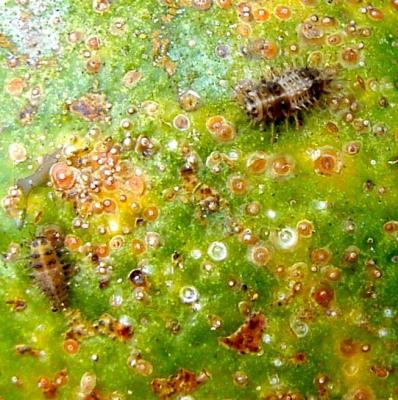



Scales
Scales are small insects (1.0 to 7 mm long), which resemble shells glued to the plant. There are many species (types) of scales on citrus, which vary in shape (round to oval) and colour according to the species.
There are two main groups: hard (armoured) and soft (naked). The armoured scales are the most serious pests.
The most important armoured scales attacking citrus are the red scale (Aonidiella aurantii), the mussel purple scale (Lepidosaphes beckii), and the circular scale (Chrysomphalus aonidum).
The most important soft scales are the soft brown scale (Coccus hesperidum) and the soft green scale (Coccus viridiis or C. alpinus).
Female scales have neither wings nor legs. Females lay eggs under their scale. Some species give birth to young scales directly. Once hatched, the tiny scales, known as crawlers, emerge from under the protective scale. They move in search of a feeding site and do not move afterwards. They suck sap on all plant parts above the ground. Their feeding may cause yellowing of leaves followed by leaf drop, poor growth, dieback of branches, fruit drop, and blemishes on fruits. Leaves may dry when heavily infested, and young trees may die.
Soft scales excrete honeydew, causing growth of sooty mould. In heavy infestations fruits and leaves are heavily coated with sooty mould turning black. Heavy coating with sooty mould reduces photosynthesis. Fruits contaminated with sooty mould loose market value. Ants are usually associated with soft scales. They feed on the honeydew excreted by soft scales, preventing a build-up in sooty moulds, but also protecting the scales from natural enemies.
Armoured scales do not excrete honeydew.
- Scales are attacked by a large range of parasitic wasps and predators. These natural enemies usually control scales. Outbreaks are generally related to the use of broad-spectrum pesticides that kill natural enemies, and or to the presence of large number of ants.
- Chemical control is possible with light mineral oils, at low concentrations (0.5-1%), mixed with other insecticides. At high concentrations, mineral oils may be harmful to the trees. Sprays should target young stages of the scales.
- Oil sprays should be carried out after picking and not during flowering or during periods of excessive heat or drought.
- To protect natural enemies alternate tree rows can be sprayed each season.
- At early stages of an outbreak cut and burn affected branches and leaves.
